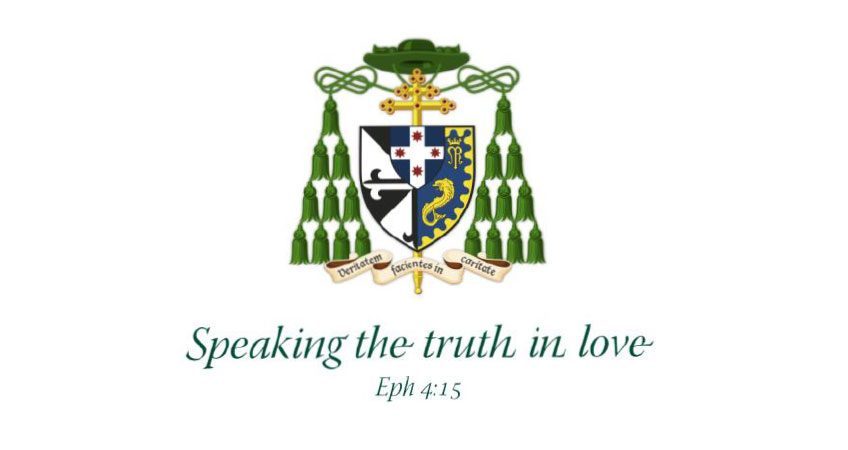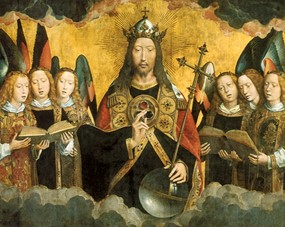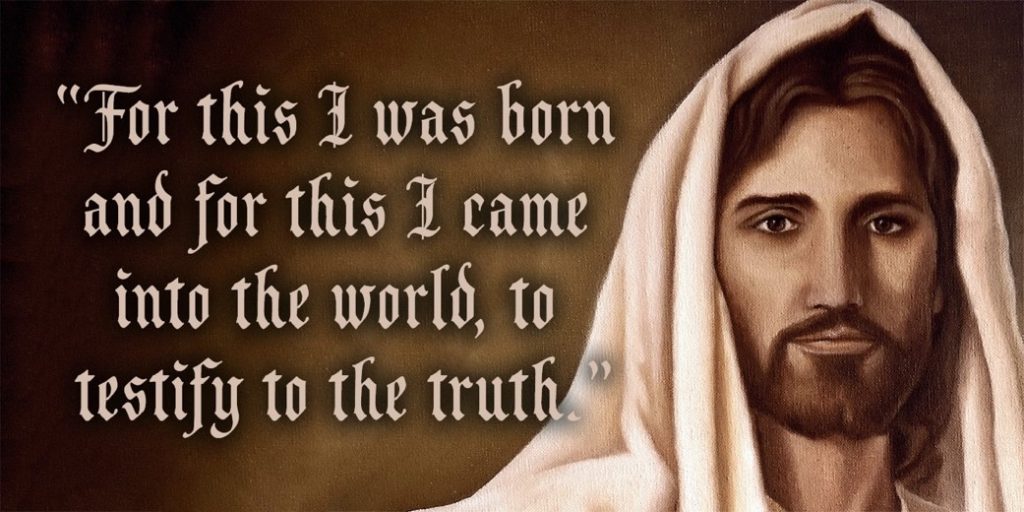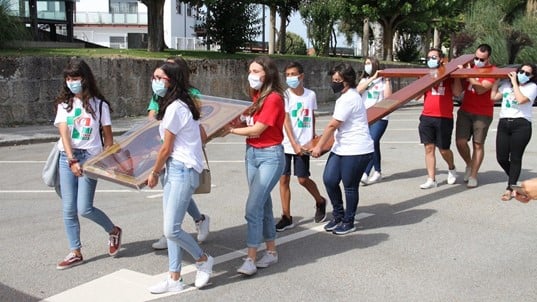HOMILY FOR MASS FOR THE SOLEMNITY OF CHRIST THE KING AND LOCAL CELEBRATION OF WORLD YOUTH DAY 2021

ST. MARY’S BASILICA, SYDNEY, 21 NOVEMBER 2021
Kings and kingship: they frame the story of Jesus. The New Testament begins with Jesus’ family tree showing He’s a direct descendant of King David, via his step-father Joseph (Mt 1:1-17; Lk 2:4). The angel Gabriel calls Jesus “heir to the throne”, Mary’s cousin calls her “Mother of my king”, Zechariah calls the boy “Saviour from the House of David”, and angels and shepherds call Him “Lord” (Lk 1:32,43,69,76; 2:11). Three oriental potentates arrive on the scene inquiring “Where is the infant king of the Jews?” (Mt 2:1-2) Even Herod the Great feigns interest in reverencing the baby king (Mt 2:8; cf. Lk 1:5). And His story begins, of course, “once in royal David’s city” (Mt 2:1-8; Lk 2:4-15; Jn 7:42).
If Jesus’ beginning was surrounded by royalty references, so was His end. At His entry into Jerusalem on Palm Sunday, the crowds hail Him as the new King David (Mk 11:10; Lk 19:38; Jn 12:13-15). At His trial Pilate asks Jesus directly if He is a king (Mt 27:11; Mk 15:2; Lk 23:3: Jn 18:33-37). Herod Antipas asks also (Lk 9:9; 13:31; 23:7-12, 15). Pilate names Him ‘King of the Jews’ before the crowd and above the cross.[1] Soldiers and criminals pretend homage[2]—but one prays honestly “Jesus, remember me, when you come into your kingdom” (Lk 23:42). The New Testament ends with Jesus in the Apocalypse of St John, first-born from the dead, enthroned as King of Kings, King Alpha and Omega (Rev 1:5-8).

: But is Jesus really a king, or is this just the fantasy of evangelists, painters and self-justifying despots? Well, throughout the Gospels people call Him “Son of David”, “King of Israel”, “Lord” or “Sire”.[3] Jesus uses the language of kings and kingdoms with reference to His heavenly Father,[4] His followers[5] and Himself.[6] He foretells His return as King (Mt 16:28; 24:14,42; 25:31-46). At the beginning of the story He’s too young to answer for Himself, and so others do so for Him. But by the end of the story, in our Gospel tonight, He has come of age. “My kingdom is like nothing on earth,” He says, “but yes, I am a king. That’s why I came.”
So it is that we call Jesus ‘Our Lord’. But what kind of lord is He? Our first reading and psalm reflect the ancient version of kingship: one of great age, robed in majesty, inspires awe; he’s got the power to conquer everyone and tell them what to do (Dan 7:13-14; Ps 92). Sure, as God Jesus is all-powerful, awesome, deserving of all praise. Yet there’s something new about Jesus’ kingship. Our second reading tells that He doesn’t hoard His power: He shares it with a line of kings and priests (Rev 1:5-8). When He returns it will be not with vengefulness but with a love that washes away our sins. Instead of fearing Him we can trust Him.

So how do we know God really loves us? Or can save us from our sins, from whatever hell we’re in or might be in the future? How do we know He even cares? Or that we can trust the Gospels and Church that tell His story? : “Yes I am a king,” Jesus says tonight, “I came into the world for this—for this one purpose: to testify to the truth. Whoever belongs to the truth listens to me.” So Christ is first and foremost king of truth, King Truth the First. But is the reign of Truth welcome today?
Well, the very next line in the Gospel is Pilate’s response: “Truth? What’s that?” Very modern of him. These days everything is relative, ‘truthish’, narratives, opinion. Even science is hotly contested, let alone deeper things like faith, morals, politics. A lot of it, we suspect, is fake news, spin, hidden agenda. Rather than make any grand truth claims, we follow the culture, whatever’s woke at the moment, whatever my loyalty group thumbs-up. If my beliefs and values are too challenging I can throw them out the window and reinvent myself. Commit if you like, but being a fomo is easier…
Problem is: at the end of all this I won’t be any the wiser about who I am and what I’m for. I’ll have missed the boat on the most satisfying human experiences, because they take commitment, self-sacrifice and perseverance. Above all, they require us to believe something, and so to think some things are true and some false. Too much cynicism and we lose sight of what’s right in front of us, like Pilate not realising that the man he’s asking “What is truth?” is Truth incarnate, the Way, the Truth, and the Life (Jn 14:6).

The Pope’s message for this 36th World Youth Day 2021 recognises that during the pandemic many young people have experienced grief or anxiety, disruption of education, work, family and friendships, and real isolation.[7] Yet many also looked after others, kept the wheels of society turning, maintained their ideals. “Whenever a young person falls, in some sense all humanity falls,” the Pope says. “Yet when a young person rises, it’s as if the whole world rises as well. Young people, what great potential you have in your hands! What great strength you have in your hearts!”
Take St Paul. On that fateful day on the Road to Damascus, Saul was blinded by the light and heard a voice saying “Saul, Saul, why are you persecuting me?” (Acts 9:1-9) “Who are you, Lord,” Saul responded, and who am I? It’s the question on every young heart. “I am Jesus whom you are persecuting!”
Here young Saul discovers a great mystery: that Jesus identifies so completely with the Church that to hurt Christians is to hurt Him. How many times have we heard someone say “Jesus yes, Church no!”, as if one was an alternative to the other? But as Pope Francis points out, there is no way to know Jesus except through the Church, her Gospels, teachings, saints, pastors, faithful, sacraments, outreach. Our Lord addresses the same gentle reproach to every young person: “How long will you flee from me? Can’t you hear me calling you? I am waiting for you…” No-one can mess up so totally that there’s no way back: the Church’s greatest enemy can yet come good. God makes greatness even out of great failures.
“When the Lord broke into Paul’s life,” the Pope goes on, “he didn’t suppress his personality or passion.” He turned them to a new end, so Saul the persecutor became Paul the evangelist. So our 2021 World Youth Day theme from the Acts of the Apostles calls us as it did Paul: “Arise! I have appointed you to testify to what you have seen” (Acts 26:16).

Tonight Pope Francis invites you all to consider joining the pilgrimage to World Youth Day in Lisbon, Portugal, in 2023. For some it will be the adventure of a life-time. For some an occasion of profound and lasting conversion. For some a lot of fun and some encouragement.
Some resist stepping out into the kingdom of Truth. The deeper and truer the communication, the more of us is revealed, some-times more than we realize or like. Speaking honestly manifests who are (or think we are), what we know (or think we know), what matters to us. But lying—asserting as true something we know to be false, intending that the hearer believe it—offers only a counterfeit both of the truth itself and of ourselves. It marks the speaker as inauthentic, undermines trust, is destructive.
But when you, my young friends, name Christ as your King, you pledge yourselves to a life of bringing Christ to a world more sorely in need of Him today than ever. It is you, each one of you, who must testify to that Truth and to its effect of healing, liberating, exhilarating!
Word of Thanks after Mass for the Solemnity of Christ the King and Local Celebration of World Youth Day 2021, St. Mary’s Basilica, Sydney, 21 November 2021
First, the bad news. This Thursday the lower house of the NSW Parliament is likely to vote on the euthanasia and assisted suicide bill—the Kill Bill. If passed it will make NSW a two stream society. There’ll be the A-Graders, whose lives are regarded as sacred and inviolable. No politician, doctor, lawyer or relative can take their life. Nor can they surrender it. No one may encourage them to kill themselves. Or give them the means. The A-Graders will have access to quality healthcare and, when the time comes, palliative care. Suicide prevention programs, depression clinics and help lines will be in place to guard against self-harm. Elder abuse and discrimination against the disabled will be resisted. In total: the A-Graders will be protected and supported by our homicide laws, medical practices, government spending, social attitudes.
But then there will be the B-Graders whose lives will no longer be regarded as sacred. The state will sanction their killing. The medical and legal professions will connive in it. No relative, friend or stranger will be permitted to interfere. Even Catholic hospitals, nursing homes and health professionals will be forced to collaborate. Nor may anyone obstruct B-graders from killing themselves. People will be free to suggest suicide to them, encourage it, give them the means. No need to treat their depression or suffering. No need to ensure they have access to a proper diagnosis, all the treatment options, good pain management. Instead of preventing suicide, elder abuse and disability discrimination, they’ll have a suicide promotion programme, an elder abuse programme, a disability discrimination programme all called ‘Voluntary Assisted Dying’. The B-Graders will no longer be protected and supported.
Once we accept such a two-tier society you can be sure that the B-Grade will soon be expanded to include the chronically but not terminally ill, the mentally not physically ill, those tired of life or feeling they’re a burden, non-consenting unconscious people and children—anyone who those with power think are better off dead or who are driven to think so of themselves.
They dress it up as compassion and choice, but V.A.D. will make suffering people suffer more and give vulnerable people fewer options. So please make your views known to our MPs if you haven’t already. Go to www.noeuthanasia.org.au for ideas on what and how. And in the meantime I implore you: pray, pray, pray. We can do better by our sick, disabled, frail elderly and dying people than this!
Now the good news. In our second reading tonight we heard that Jesus our high priest has made us into a line of priests to serve God the Father. Well, it is my special joy to announce that:
- This Tuesday night 23rd November at 6pm at Yagoona seminarian Adrian Simmons will be ordained a deacon
- This Saturday 27th November at 10:30am at Bankstown seminarian Ben Saliba will be ordained deacon
- On Tuesday 30th November at 6pm at Cronulla seminarians Mark Anderson and Michael Kasiita will be ordained deacons
- On Friday 3rd December at 7pm here at St Mary’s Cathedral Deacons Rafael Silva Galicia and Anderson Gallego Rodas will be ordained priests
- On Saturday 4th December at 10:30am at Broadway seminarian Ben Gandy will be ordained deacon and
- On the Solemnity of the Immaculate Conception Wednesday 8th December at 7pm here at St Mary’s Cathedral Fr Danny Meagher will be ordained an auxiliary bishop of Sydney.
That’s right: there will be eight ordinations here in Sydney in the next fortnight or so, to all three orders of deacon, priest and bishop! It will be an extraordinary time of grace for our Archdiocese as so many give themselves to the service of God and His people. We give thanks to them and to Almighty God for this. And we look forward to lots more vocations in the coming years. Pick at least one of these ordinations to come to: you will be truly inspired. And pray that these eight guys will be the good shepherds we need and God desires them to be.
Finally, my young friends, thank you for joining me tonight for this celebration of Christ the King. For Him to truly reign in our world He must first reign in our hearts, thoughts and deeds. So invite Him into your life. Surrender to his government. You will lose nothing and gain everything. He wants to be king of youth not to control you but to inspire, empower, love and save you!
[1] Mt 27:11, 37; Mk 15:9,12,26; Lk 23:38; Jn 18:39; 19:14-15,19-22.
[2] Mt 27:27-31, 42; Mk 15:16-20, 32; Lk 23:11, 37; Jn 19:2-3.
[3] Mt 1:1; 3:2-3; 7:21-22; 8:2,6,8,21,25; 9:27-28; 12:23; 14:28,30; 15:22,25,27; 16:22; 17:4,15; 18:21; 20:30-33; 21:3,9,15; 22:42; 24:42; 26:22; Mk 1:3; 10:47-48; 11:9; 12:35; Lk 1:17; 2:26; 3:4; 5:8,12; 6:46; 7:6,13,19; 9:54,59,61; 10:1-2,17,39-41; 11:1,39; 12:41,42; 13:15,23,25; 17:5-6,37; 18:6,38-39,41; 19:8,31,34; 22:33,38,49,61; 24:34; Jn 1:23,49; 6:15,23,68; 9:38; 11:2-39; 12:13; 13:6-14,25,36-37; 14:5,8,22; 16:19-20; 20:2,13-28; 21:7-16,20-21.
[4] Mt 6:10; 22:2-13; 26:29; Mk 4:26, 30; Lk 8:1; 11:2; 13:18, 20, 29; 16:16; 17:20-21; 19:11; 21:31.
[5] Mt 5:3, 10, 19-20; 6:33; 7:21; 8:11; 11:11; 13:11, 19, 24, 31, 33, 38, 43-7, 52; 16:19; 18:1-4, 23; 19:12-14, 23-24; 20:1; 25:1, 34, 40; Mk 4:11; 9:47; 10:14-15, 23-25; 12:34; 15:43; Lk 6:20; 7:28; 8:10; 9:2, 27, 60-62; 10:9,11; 12:31-2; 14:15, 31; 18:16-17, 24-25, 29; 19:11,27; 20:37-44; 22:29-30; 23:51; Jn 3:3,5.
[6] Mt 4:7,17,23; 9:35; 10:7; 12:8,25-28, 36-37; 21:5, 43; 22:41-5; Mk 1:14; 3:24; 5:19; 11:3; 14:25; Lk 4:12,43; 6:5; 9:11; 11:17-20; 22:16, 18, 29; 23:2; Jn 18:36-37.
[7] Pope Francis, Message for the 36th World Youth Day (27 September 2021) https://press.vatican.va/content/salastampa/it/bollettino/pubblico/2021/09/27/0605/ 01290.html#en.
Welcome to St Mary’s Basilica in Sydney for our Mass for the Feast of Christ the King, the last Sunday of the liturgical year 2021. It is a kind of segue into the season of Advent when we prepare for the coming of Christ upon the clouds as king at the end of time, and as little prince of hearts at Christmas. Nowadays this Feast Day is also the annual diocesan celebration of World Youth Day in those years when there is no international gathering. So tonight we celebrate our youth, their faith and ideals, gifts and talents, aspirations and energy, commending them to the kingship of Jesus.
To everyone present on this special Feast day, especially our young people here in the cathedral or watching via livestream, a very warm welcome!

